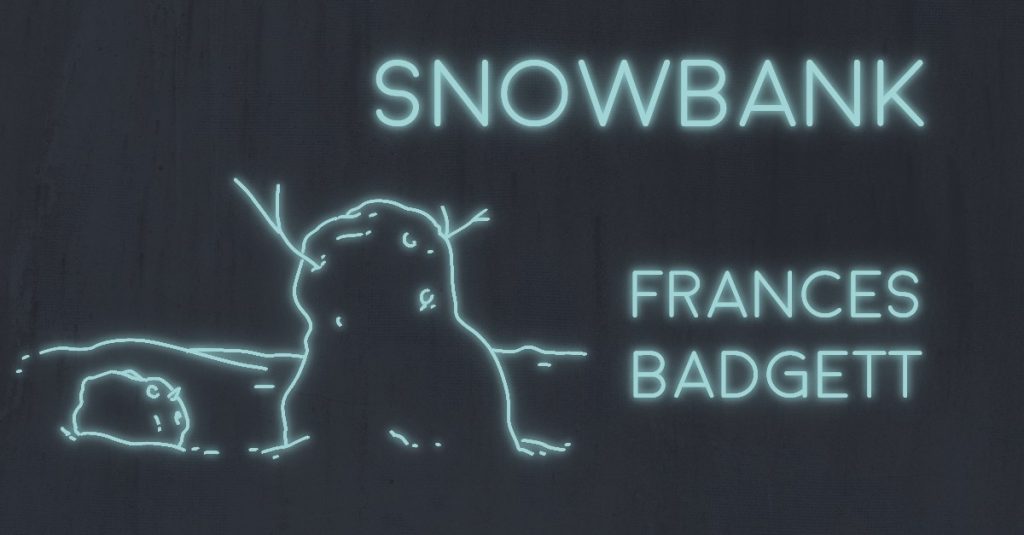The night comes on so quietly, a hush riding each flake to the ground. The snowman slumps against the brambles, overwhelmed, the new snow wet, heavy. The quiet is unsettling, and all Mara can hear is the hiss of tinnitus in her left ear. She pops in headphones and listens to a meditation, the brain’s static between the breaths. The pressure of trying to relax wakes her up, agitates her. Paul’s on the porch, muffled thumps and the creak of the front door. She opens her iPad and checks to see the constellation overhead. Hydra, a favorite of hers from a childhood book on Greek myths. Removing an acid-spitting head, Hydra will grow two in its place. Survivor until Hercules and his nephew, Iolaus, strike her down. Hercules with the sword, Iolaus with a flaming torch. She turns off the iPad and closes her eyes to the meditation, the sound between the bells a swish of anxiety. Something with rain or waves, maybe. Something with wind. Nothing works.
Paul’s quiet footfall is more distracting than if he were stomping, a thing Mara says but can’t explain. He slumps into bed and sighs, wanting to talk. She does not. She turns off the meditation and answers his questions about her day—yes, work was fine; no, she doesn’t want to skip the teachers’ party in March; yes, she will be out of school the second week in April; no, she doesn’t want to go to Miami for a week in June. Paul’s new building is growing bones, walls, is looking like the drawing. Studios above a sprawling gallery, it has a pretentious color name like The Vermilion or The Chartreuse. But what Mara doesn’t say is that the building is the drawing somehow reduced, somehow more plastic. No mature trees, no unidentifiable people out front, no artful sidewalk of squares and no distinctive Paul lines and marks, his signature hatches and swirls, and therefore, somehow more than the building itself, the building a crude rendering of Paul’s spectacular art. She listens as he describes the slate for the fountain, the lights for the plantings.
“The trees?”
“Yes, those, too. All of it lit.”
He is asleep quickly, he falls hard. She drifts on waves of dreams, of Hercules and Hydra, of the way a story can mean something to the Greeks and another to us. It seems unfair, punishing the hero with twelve tasks no one else can handle. She thinks of Jared, her smallest, most gentle student, how the world hurls challenges at him, how he manages to dodge, to remain whole. His mother a drinker, father absent much of the time. She loves the way Jared writes, lightly corrects his spelling. “More,” she tells him. “Keep going.” But Agatha, no. Agatha gets her other self, the demanding teacher, corrective, stern. She twists with anxiety at the thought. Agatha is perfectly fine. Unremarkable. She should be a softer teacher. She replays in her mind all the times she has transgressed, has spoken sharply to this girl who needs more love than the others, who doesn’t ask for too much.
She falls asleep the hour before dawn and wakes exhausted, more tired than she will be all day. Paul is already up, humming over the presspot, plucking bacon from the pan. She slides her binder of lesson plans into her worn tote and yawns.
“I have to go in early. We have a hip hop instructor coming.”
“I want to go to your class,” Paul says, and though he’s been cute and sweet, Mara wants to scream.
“And what would you teach?”
“How to draw people to scale against monumental apartment blocks.”
She imagines Jared, his small, dirty hands clutching colored pencils, hatch mark shadows behind vague outlines suggest people, pets, a few trees. Agatha would draw puffy cats, a dozen or so, and pretend she was following the assignment.
Paul does not come to her class. He flips his leg over his bicycle and glides off into the snowscape of their narrow alley, the street beyond. She drives slowly, the streets clear, the schools on time, children starting their ambles and snowball fights and snow angels on their way, snowbanks dotted with boot prints and lost mittens.
She loves the room like this, empty, quiet, the clock’s tick loud. Planners and binders holding the order of the day. She is concerned about Lily’s reading skills. She wants to like Agatha.
The day is lost to the snow, their eyes and bright cheeks watching every flake drift down, their bodies turned to the windows. They hear some of what she says, but not much. She isn’t worried, today is light. Today is a day she can erase if she needs to. Every day is shaped from air.
Jared calls to say he will be late, midnight late. The children file out after the bell, voices filling the halls with screams and squeals. No school tomorrow. None for the rest of the week.
The next morning, she picks a boring apartment, cold and bright, the light bouncing off the snow outside and into her, filling the windows with glow well after dark. She packs exactly one bag, a neat collection of bundled things, and takes one pair of shoes. The apartment looks like every apartment, beige and mauve, exhausted around the edges, chipped counters and worn handles. She stretches on the floor and feels the vibrations of the neighbors below, the ease and thud of snow off the roof, the muffled quiet of voices in the street. She breathes her own air and opens her own book and reads, sitting on the floor, by the window.
Paul calls and calls again. Remove a head, and another grows in its place.

